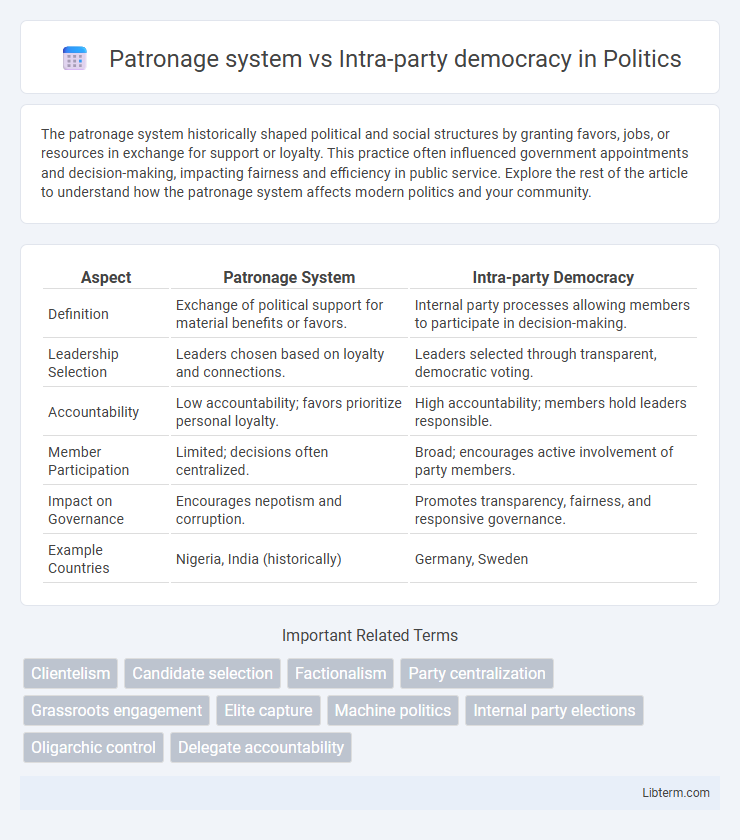The patronage system historically shaped political and social structures by granting favors, jobs, or resources in exchange for support or loyalty. This practice often influenced government appointments and decision-making, impacting fairness and efficiency in public service. Explore the rest of the article to understand how the patronage system affects modern politics and your community.
Table of Comparison
| Aspect | Patronage System | Intra-party Democracy |
|---|---|---|
| Definition | Exchange of political support for material benefits or favors. | Internal party processes allowing members to participate in decision-making. |
| Leadership Selection | Leaders chosen based on loyalty and connections. | Leaders selected through transparent, democratic voting. |
| Accountability | Low accountability; favors prioritize personal loyalty. | High accountability; members hold leaders responsible. |
| Member Participation | Limited; decisions often centralized. | Broad; encourages active involvement of party members. |
| Impact on Governance | Encourages nepotism and corruption. | Promotes transparency, fairness, and responsive governance. |
| Example Countries | Nigeria, India (historically) | Germany, Sweden |
Understanding Patronage Systems: Definition and Origins
Patronage systems are political structures where resources and favors are exchanged for political support, originating from clientelism practices in ancient societies. These systems prioritize personal loyalty and reciprocal obligations over formal institutional processes, often leading to hierarchical networks dominated by influential patrons. Understanding the origins of patronage highlights its deep roots in socio-political relationships, contrasting sharply with the more transparent, participatory mechanisms found in intra-party democracy.
Intra-party Democracy: Key Principles and Practices
Intra-party democracy emphasizes transparency, member participation, and accountability within political parties, ensuring leaders are elected through competitive, fair processes. Key practices include open debates, inclusive decision-making, and regular internal elections, fostering responsiveness to the party base. This system counters patronage by promoting merit-based leadership and reducing centralized control over party resources.
Historical Evolution: Patronage vs Intra-party Democracy
The historical evolution of the patronage system reveals a political practice deeply rooted in favoritism, where power holders distribute resources and positions to allies, often undermining meritocracy and transparency. In contrast, intra-party democracy emerged as a response to centralization and autocratic party control, promoting member participation, competitive candidate selection, and accountability within party structures. This shift marks a significant transformation towards institutionalized political engagement and governance reform, emphasizing collective decision-making over personalized power exchanges.
Power Structures: Centralization vs Decentralization
The patronage system centralizes power by concentrating decision-making authority in a few key leaders who control resource distribution to maintain loyalty and influence. Intra-party democracy promotes decentralization, allowing party members to participate in policy-making and leadership selection, thereby diffusing power across various levels of the organization. This structural contrast shapes governance efficiency, accountability, and the capacity for political renewal within parties.
Candidate Selection Processes: Meritocracy vs Loyalty
The patronage system prioritizes loyalty in candidate selection, rewarding political supporters and allies with nominations regardless of merit, which often reinforces entrenched power structures. In contrast, intra-party democracy emphasizes meritocracy by promoting transparent, competitive processes that evaluate candidates based on qualifications, performance, and popular support within the party. This merit-based approach fosters accountability, encourages policy innovation, and enhances the legitimacy of political representatives.
Impact on Political Accountability and Transparency
The patronage system undermines political accountability and transparency by fostering loyalty through personal favors rather than merit, enabling corruption and opaque decision-making. Intra-party democracy enhances accountability by promoting inclusive candidate selection and open debate, leading to more transparent governance and responsiveness to constituents. Empirical studies show countries with stronger intra-party democratic practices exhibit lower corruption levels and higher public trust compared to those dominated by patronage networks.
Effects on Grassroots Participation and Inclusiveness
The Patronage system often centralizes power by rewarding loyalty, which can suppress grassroots participation and limit inclusiveness by favoring established networks over new voices. In contrast, Intra-party democracy encourages broader member involvement in decision-making processes, enhancing grassroots engagement and promoting inclusiveness by allowing diverse perspectives to influence party policies. Empirical studies show parties with strong intra-party democratic structures tend to exhibit higher levels of member activism and more representative candidate selection.
Corruption and Abuse: Risks in Different Systems
Patronage systems cultivate corruption by promoting loyalty through favors, resulting in unequal resource distribution and entrenched power networks that enable abuse. Intra-party democracy mitigates these risks by fostering transparency and accountability within parties, though it can still face manipulation through factionalism and insider influence. The structural openness of intra-party democracy generally reduces systemic corruption compared to patronage-based models, where personal gain often outweighs public interest.
Global Case Studies: Patronage and Democratic Reform
The patronage system, rooted in clientelism and resource distribution, often hinders democratic reforms by entrenching elite control and limiting political competition, as seen in countries like Nigeria and India. In contrast, intra-party democracy encourages transparency, internal elections, and accountability within political parties, promoting broader participation and reform, exemplified by the evolution of South Africa's African National Congress and Mexico's Institutional Revolutionary Party. Global case studies reveal that transitioning from patronage-based politics to intra-party democracy is critical for strengthening democratic institutions and reducing corruption.
Future Prospects: Strengthening Intra-party Democracy
Strengthening intra-party democracy enhances transparency, accountability, and member participation, which are critical for sustainable political development and reducing patronage-based inefficiencies. Implementing digital platforms for internal elections and decision-making can democratize party structures and encourage broader representation, fostering future political stability. Emphasizing merit-based candidate selection and policy formulation promises to strengthen governance and public trust in political institutions.
Patronage system Infographic

 libterm.com
libterm.com